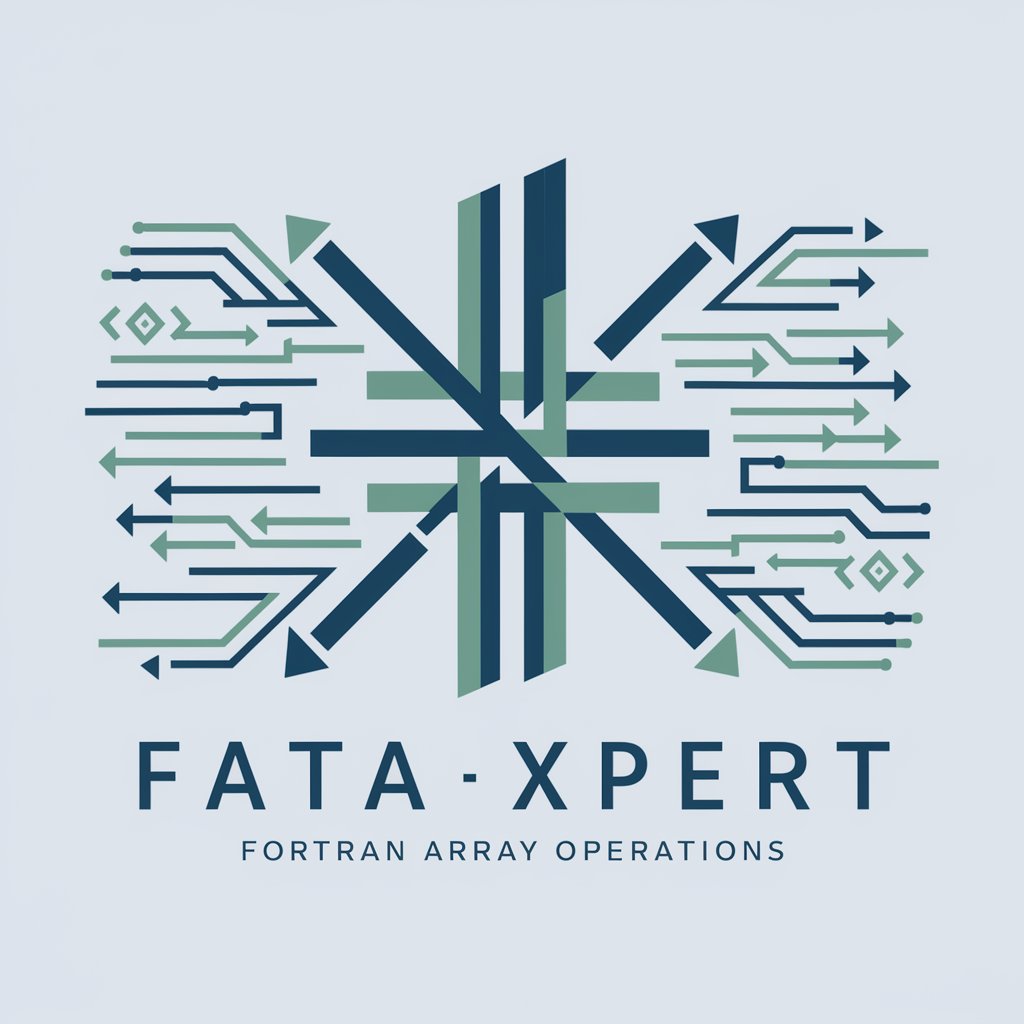🚀 Fortran Array Operations Expert - Fortran Array Expertise

Welcome! Ready to dive into Fortran array operations?
Optimizing Fortran Arrays with AI
How can I optimize array operations in Fortran for large datasets?
What are some efficient methods for data processing using Fortran arrays?
Can you provide a Fortran code example for matrix multiplication?
How do I handle multidimensional arrays in Fortran for scientific computations?
Get Embed Code
Introduction to 🚀 Fortran Array Operations Expert
The 🚀 Fortran Array Operations Expert is a specialized guide designed to assist users in leveraging Fortran for complex array operations, especially in the context of scientific computing and data-intensive tasks. Fortran, known for its efficiency in numerical computation and array manipulation, serves as a foundational tool for engineers, scientists, and researchers. This expertise focuses on optimizing array operations, from basic manipulation to advanced processing techniques, ensuring users can tackle large datasets with precision and efficiency. Examples include optimizing numerical simulations by efficiently handling multi-dimensional arrays, or streamlining data analysis tasks by applying parallel processing techniques to large arrays. Powered by ChatGPT-4o。

Main Functions of 🚀 Fortran Array Operations Expert
Efficient Array Manipulation
Example
Rearranging or reshaping large multi-dimensional arrays for numerical simulations in physics or engineering.
Scenario
A physicist simulates quantum systems and needs to reshape a 4D array representing quantum states over time into a 2D matrix for analysis. Using Fortran's intrinsic array manipulation capabilities, such as RESHAPE and TRANSPOSE, enables efficient data structuring for analysis.
Parallel Array Processing
Example
Leveraging Fortran's coarray features or MPI for distributed computing to process large datasets.
Scenario
A climate scientist processes decades of global temperature data stored in massive arrays. By employing Fortran's parallel processing capabilities, the scientist distributes the workload across multiple processors, significantly reducing computation time and enabling more complex and detailed climate models.
Optimization Techniques for Large Datasets
Example
Applying array slicing, masking, and conditional operations to filter and analyze large datasets efficiently.
Scenario
In financial modeling, an analyst needs to filter out stock market data based on certain conditions (e.g., specific date ranges, stock symbols). Using Fortran's array slicing and conditional operations, the analyst can efficiently manipulate and analyze the dataset, optimizing performance for high-frequency trading algorithms.
Ideal Users of 🚀 Fortran Array Operations Expert Services
Scientists and Engineers
Individuals in fields like physics, engineering, and climate science, who deal with large numerical datasets and require efficient computation for simulations, modeling, and analysis. They benefit from Fortran's performance in numerical computations and array operations.
Data Analysts in Finance and Economics
Professionals who require fast and efficient processing of financial datasets for analysis, forecasting, and trading algorithm development. Fortran's array manipulation capabilities enable them to handle large volumes of data with high performance.
Academic Researchers
Researchers in academia conducting complex data analysis, computational research, or developing scientific models that rely on large datasets. They benefit from Fortran's efficiency and the detailed guidance provided for optimizing array operations in their research.

Using 🚀 Fortran Array Operations Expert
Start Your Journey
Begin by navigating to yeschat.ai for an initial experience without the need for sign-in or a ChatGPT Plus subscription.
Define Your Problem
Clearly outline your array operation challenge, including data sizes, specific computations, or optimization needs.
Prepare Your Code Snippets
Gather any existing Fortran code or data structures you're working with to provide context for your questions.
Engage with Expertise
Submit your query detailing the array operations or performance issues you're facing in Fortran.
Implement Solutions
Apply the provided Fortran code solutions and explanations to your project, and don't hesitate to ask follow-up questions for clarification or further optimization.
Try other advanced and practical GPTs
Podcast Finder
Discover Your Next Favorite Podcast

Intellect Navigator Enhanced
Empowering legal professionals with AI.

Artistic Script Weaver
Crafting Artistic Scripts with AI Precision

Psychology 101 (not medical advice)
Empowering Insights with AI Psychology

Dream interpreter
Uncover the Secrets of Your Dreams

Psychedelic experience simulations
Explore Your Mind, Free from Substances

Smart Shopper
Empowering your shopping with AI.

Techno-Mysticism Fusion
Where Cybernetics Meets Mysticism in Art

Personal Assistant Pro
Empowering your daily tasks with AI

Ruby Renaissance: Bundler for Project Success
Streamlining Ruby projects with AI-driven dependency management.

Web Design Mentor
Empowering Your Design Journey with AI

Automotive Industry Consultant
Empowering Automotive Decisions with AI

Q&A about 🚀 Fortran Array Operations Expert
What makes 🚀 Fortran Array Operations Expert unique in handling large datasets?
This tool leverages Fortran's strengths in array processing and numerical computation, offering optimized, efficient solutions specifically tailored for large datasets and complex numerical tasks.
Can it help optimize existing Fortran code for better performance?
Absolutely, by analyzing your current implementation and data structures, it provides tailored advice on optimizing array operations, parallel processing, and memory management in Fortran.
Is prior experience with Fortran necessary to use this tool effectively?
While prior experience is beneficial, this tool is designed to assist users at all levels, providing detailed code examples and explanations that can help even beginners understand and apply Fortran array operations effectively.
How does it support projects with specific computational requirements?
By understanding your project's unique computational needs, it can suggest specific Fortran modules, intrinsic functions, and algorithmic approaches to meet those requirements efficiently.
Can this tool assist in parallelizing Fortran code for HPC systems?
Yes, it offers guidance on using Fortran's coarray features and MPI (Message Passing Interface) for parallel computing, helping to scale your computations across multiple processors in high-performance computing environments.
